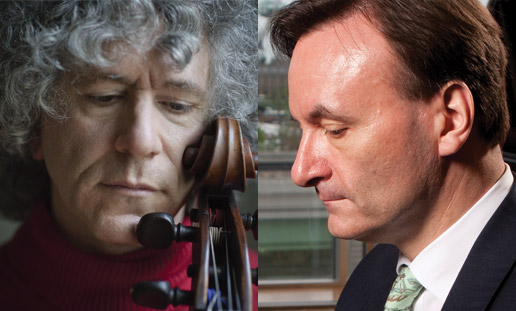Isserlis and Hough prove a complementary duo in belated New York debut
It was a little surprising to discover in the program notes—given this duo’s reputation and 25-year performance history—that cellist Steven Isserlis and pianist Stephen Hough were making their New York debut with Tuesday night’s concert at the 92nd Street Y. The renowned artists chose a diverse menu, including some of the works they have recorded over the years.
With the opening work, Dvořák’s lovely Waldesruhe (“Silent Woods”), Isserlis showed an interesting trait: when playing, he rarely looks down at his instrument, but either up to the ceiling or out at the audience. Not only does it suggest that his nose isn’t buried in the score, but that he is able to locate complex fingerings primarily by touch. For his part, Hough was relaxed and unfussy, and the balance between the two was near-ideal.
Josef Suk’s music should be heard more often, especially an engaging example like his early Ballade and Serenade for Cello and Piano, Op. 3, written when the composer was just sixteen years old. The Ballade is luxuriously scored, with sweeping passages and melodic lines, with the ensuing Serenade perkier in style. The final pages were especially delightful as Isserlis and Hough scampered through to the end, in which the cello lands on an ethereal pizzicato.
Thanks to slight changes enabling it to be performed on a modern cello, Schubert’s Sonata in A minor for Arpeggione and Piano, has had a second life in contemporary performance. (Developed in the 1800s, the arpeggione is a six-stringed instrument not unlike a guitar, but bowed like a viola da gamba.) Now and then the cellist’s intonation was a little dicey, especially in the instrument’s higher registers, but most of the time fluidity combined with expressivity, melded to engaging piano and cello tone.
Hough is a bona fide polymath—among his many talents, he has written a book, maintains a blog, and brings the same intellectual strength to these endeavors as he does to his musicianship. He composed his Sonata for Cello and Piano, Left Hand in 2013, originally at the request of another pianist, but the commissionee regained the use of his right hand and never performed it, leaving Hough to do the performance honors himself. Subtitled “Les Adieux,” the sonata is primarily tonal and opens with a simple “A” note, tossed back and forth between the cello and piano like a secret signal. The interplay—the two often mirroring each other’s phrases—ends with an intense climax before subsiding into a pizzicato section leading to the quiet close.
For the finale, the two plunged into Grieg’s classic Cello Sonata in A minor, a concoction favored by great cellists such as Casals and Rostropovich, with two spirited movements bookending a slower, more contemplative one. In the former, exciting as they were, the speeds taken seemed slightly precarious, with some cello intonation again the collateral damage. But the middle movement, marked “Andante molto tranquillo,” was the most successful, with Isserlis producing passionate long lines and Hough remaining unruffled in the sometimes thorny piano role.
A humorous encore is always welcome. After a mock jab at his colleague “who doesn’t know how to spell his first name correctly,” Isserlis mentioned their 2006 recording called Children’s Cello. From that project they chose the brief “Berceuse Orientale,” the third in a set called Eight Very Easy Pieces (1921), by Ludwig Lebell. As the pianist blithely executed the rudimentary part with just his right hand, and the cellist nonchalantly bowed a bland ostinato, back-and-forth on open strings, a man emerged from the wings with a tray and two glasses of champagne. Without a pause, Hough calmly took a glass with his left hand, and the man then served Isserlis, feigning increasing listlessness, as laughter ricocheted through the audience.



